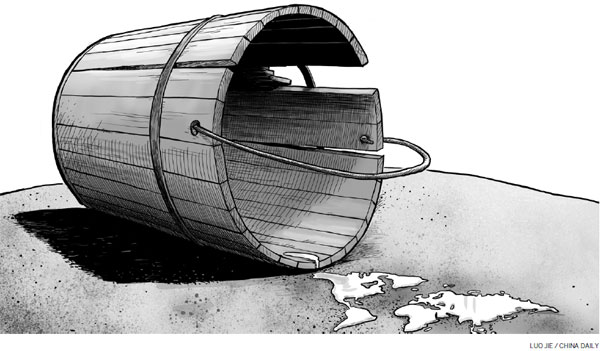
Peter Brabeck-Letmathe and Asit K. Biswas
CHINA DAILY | February 9, 2015
Over the past two decades climate change has steadily climbed the international political agenda, but sadly water issues have not received such attention. Climate change is indeed important. But mitigating climate change alone will not solve the water scarcity problem. Unlike the efforts needed to mitigate climate change, which is characterized by uncertainties, we know how to solve the water problem, for we have the knowledge, technologies and funds necessary for the purpose. Yet poor water management continues across the world with no signs of improvement.
Agriculture accounts for nearly 70 percent of all global water use. But there is not a single country where farmers pay the full operation and maintenance costs, let alone investment costs, for the water they use. Even for household water, people in very few cities pay the real cost of water services. With sensible water pricing, utilities can become financially viable and people can be made to use water efficiently.
For example, in Qatar, a desert country, Qatari nationals don’t pay any water tariff, and expatriates pay about one-third of the cost. Qatar has one of the highest per capita water consumption in the world – about 430 liters. Add to this nearly 35-50 percent loss from the system, which means Qatar has to produce 580-645 liters of water per person per day. But on average Qatari nationals, who receive water free, use about 1,200 liters of water a day. This means on average they receive 1,620-1,800 liters water (factoring in the waste) every day. This contrasts sharply with a Hamburg resident who uses about 110 liters a day.
Poor water management over decades has created numerous structural problems. The Aral Sea used to be the world’s fourth largest freshwater lake. The diversion of two rivers, Amu Darya and Syr Darya, which provided it with a steady flow of freshwater, for cotton production, has reduced it to only a small shadow of its glorious self.
Take China as another example. In the 1950s, it had 50,000 rivers that had a catchment area of 100 square kilometer or more each. By 2013, the number of such rivers had reduced to 27,000. Many rivers have simply disappeared because of overuse by agriculture and industry.
Increasing industrial, household and agricultural activities have seriously polluted water bodies in nearly all urban centers of the developing world. By 2011, water from more than half of China’s largest lakes and rivers were declared unfit for human consumption, and more than half of the groundwater in northern China was polluted.
In India, a 2013 report shows that water in nearly half of its 445 rivers are too polluted for human consumption. In fact, water from an overwhelming number of water bodies in India can no longer be used without expensive treatment. As water becomes increasingly scare, the economic, social, health and environmental costs of such heavy contamination are rising steadily. In some countries, the real costs of poor water management can add up to 5 percent of GDP.
If the current trends continue, the situation can only get worse. Nearly two-thirds of industrial companies now say water poses a substantial risk to their business.
Millions of people die every year because of water-related diseases. Droughts and floods inflict billions of dollars in damages year after year. The United Nations has estimated that droughts are the world’s costliest natural disasters, inflicting $6-8 billion annual losses. Floods cause major damage, too, in terms of lives and money. All this can be significantly reduced by better water management.
As poet W.H. Auden said: “Thousands have lived without love, but not one without water.”
Peter Brabeck-Letmathe is the chairman of the board of Nestlé, and chairs the 2030 Water Resources Group. Asit K. Biswas is distinguished visiting professor at Lee Kuan Yew School of Public Policy, Singapore, and co-founder of the Third World Centre for Water Management, Mexico.
Source: http://bit.ly/1SK35yH